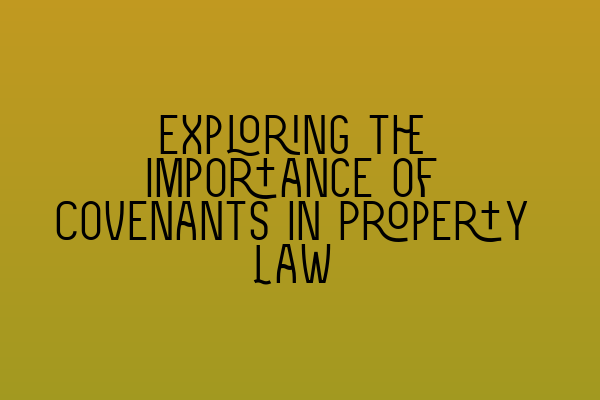Exploring the Importance of Covenants in Property Law
When it comes to property law, there are various elements and concepts that are essential to understand fully. One such concept is covenants. Covenants play a vital role in property transactions and can have a significant impact on the rights and obligations of property owners.
But what exactly are covenants, and why are they important?
Understanding Covenants
In property law, a covenant is a legally binding agreement between two parties that outlines certain rights, obligations, and restrictions related to the use and enjoyment of a property. These agreements are typically included in a property’s title deeds and are passed on from one owner to the next.
Covenants can be positive or negative in nature. Positive covenants require the property owner to do something or take certain actions, such as maintaining the property in a certain condition or paying common area maintenance fees. On the other hand, negative covenants restrict the property owner from doing specific actions, such as building structures that obstruct views or engaging in certain activities on the property.
The Importance of Covenants
Covenants serve several important purposes in property law. Firstly, they help to establish and maintain the character, quality, and value of a property or a development. For example, in a residential development, there might be covenants in place that restrict the type of external modifications that can be made to homes, ensuring a consistent and aesthetically pleasing neighborhood.
Covenants also play a crucial role in protecting the rights and interests of property owners. They provide a legal framework for resolving disputes and enforcing obligations. For instance, if a property owner fails to pay their service charges in a shared development, the covenant allows the management company to take legal action to recover the outstanding fees.
Furthermore, covenants can have a significant impact on the use and enjoyment of a property. For example, in a commercial building, there may be covenants in place that prohibit certain businesses from operating to protect the interests of existing tenants or to maintain the overall character of the building.
Enforcing Covenants
Enforcing covenants can be a complex process, and it often requires legal expertise. A breach of covenant may result in legal action, damages, or an injunction to prevent the continuation of the violation. Solicitors who specialize in property law can help property owners navigate the complexities of covenant enforcement and protect their rights.
Understanding covenants is crucial for property owners and those involved in property transactions. It is essential to carefully review the covenants of a property before purchasing it to ensure they align with your intended use and meet your expectations. Additionally, if you are considering imposing covenants or modifying existing ones, it is vital to seek legal advice to ensure compliance with relevant laws and regulations.
In conclusion, covenants are an integral part of property law, serving to establish rights, obligations, and restrictions on property owners. They play a crucial role in maintaining property values, protecting interests, and regulating the use and enjoyment of properties. Understanding and enforcing covenants are crucial for a smooth and legally compliant property transaction.
For more information on property law, preparing for the SQE exams, or finding upcoming exam dates, please check out our related articles:
